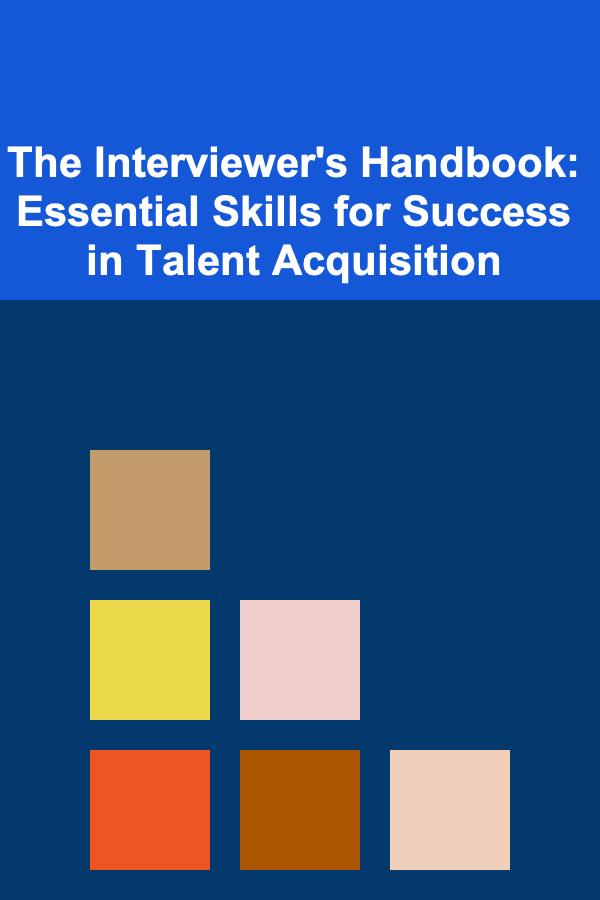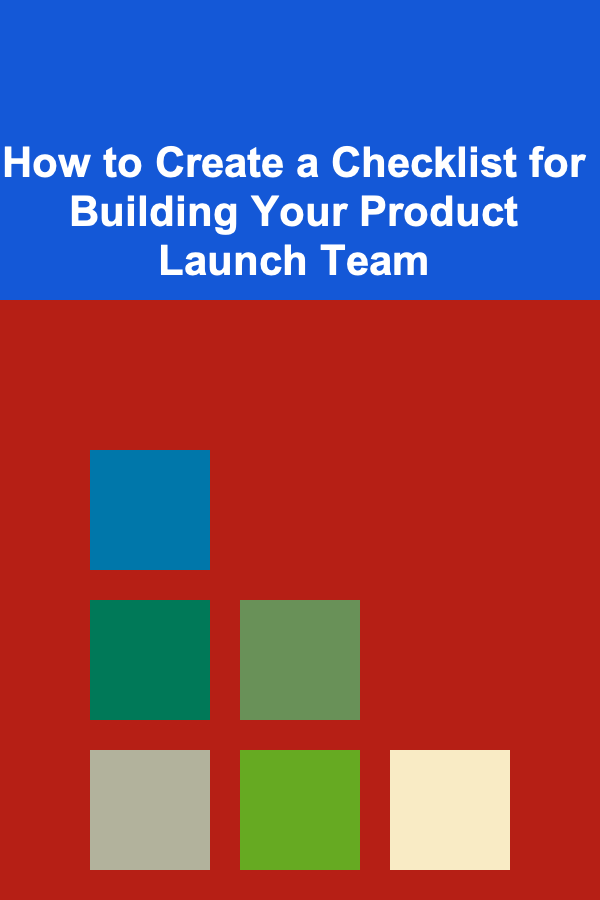
The Interviewer's Handbook: Essential Skills for Success in Talent Acquisition
ebook include PDF & Audio bundle (Micro Guide)
$12.99$9.99
Limited Time Offer! Order within the next:

In talent acquisition, the interview process is pivotal not just for assessing candidates, but for shaping the future of an organization. An effective interviewer is one who not only identifies the best fit for the role but also creates a positive candidate experience that enhances the employer brand. This guide is designed to help interviewers build the skills necessary for conducting thorough, fair, and impactful interviews that lead to better hiring decisions.
Preparation: Laying the Groundwork for Success
The key to a successful interview starts well before the candidate walks through the door (or logs into the virtual meeting). Proper preparation is essential for ensuring that the interview is efficient, fair, and productive. Here's how to prepare:
a. Know the Role Inside and Out
Before even reviewing resumes or meeting candidates, interviewers must have a thorough understanding of the job requirements. This includes:
- Job Description: Familiarize yourself with the key responsibilities, qualifications, and expected outcomes. You need to know what a successful candidate looks like to ask the right questions.
- Skills and Competencies: Make a list of both the technical and soft skills required for the role. These should guide your questioning during the interview.
- Team Dynamics: Understand the team the new hire will be joining and the dynamics of the workplace. This helps you assess if a candidate is not only fit for the role but will also complement the existing team culture.
b. Review the Candidate's Resume and Application
Before meeting the candidate, take time to study their resume or application thoroughly. Identify key areas that you want to explore, such as:
- Work History: Look for patterns in their career progression. Have they changed jobs frequently, or have they stayed in a position long term?
- Achievements: Look for accomplishments that stand out. Are they quantifiable? How do these align with the role you're hiring for?
- Skills & Certifications: What qualifications are they highlighting? Are these relevant to the position, or do you need to explore them further?
c. Prepare Structured Interview Questions
The best interviews are those that are structured, focusing on specific competencies and role-related skills. Structured interviews allow for consistency and help interviewers compare candidates objectively. Use a mix of these question types:
- Behavioral Questions: Ask the candidate to describe past experiences that demonstrate the skills required for the role. For example, "Tell me about a time you had to manage a difficult project under tight deadlines."
- Situational Questions: These hypothetical questions assess how candidates might respond to future challenges. For instance, "How would you handle a situation where you have to lead a project with minimal supervision?"
- Technical Questions: For specialized roles, include questions that test the candidate's technical expertise, such as problem-solving exercises or case studies.
Building Rapport: Setting the Right Tone
Creating a comfortable environment is crucial for helping candidates perform at their best. The interview should feel like a conversation rather than an interrogation. Here's how to establish a positive rapport:
a. Start with Small Talk
Begin the interview with light, friendly conversation. This helps to ease nerves and signals to the candidate that you are approachable. Ask about their journey to the interview or comment on something you genuinely find interesting from their resume.
b. Set Expectations Early
Let candidates know the structure of the interview. Explain how long the interview will take, the types of questions you will ask, and that you're interested in hearing their thoughts. This transparency makes candidates feel more at ease and helps them better prepare their answers.
c. Be Attentive and Engaged
During the interview, make sure to listen actively. Give your full attention to the candidate, make eye contact, and show interest in their answers. This engagement helps foster a connection and allows you to assess the candidate's communication skills and emotional intelligence.
Conducting the Interview: Uncovering Core Qualities
The heart of the interview process is gathering insights into the candidate's qualifications, skills, and cultural fit. While it's tempting to rush through questions or rely on gut instincts, successful interviewers use a methodical approach to assess the following:
a. Assessing Competencies and Skills
Competency-based interviewing is one of the most effective ways to evaluate whether a candidate has the skills to succeed in the role. During the interview, focus on:
- Past performance: Ask the candidate to provide specific examples of how they've applied the skills required in their previous roles.
- Problem-solving abilities: Include questions that test a candidate's ability to approach and solve challenges.
- Soft skills: Assess abilities like communication, teamwork, and adaptability. These qualities are often just as important as technical skills, especially in collaborative environments.
b. Listening for Subtext
Sometimes, what a candidate doesn't say can be as telling as what they do say. Watch for:
- Red flags: Inconsistencies in their employment history, hesitation to explain gaps in their resume, or a lack of enthusiasm for previous roles.
- Body Language: Non-verbal cues can provide important insights. Are they engaging? Are they confident? Or do they appear closed off or defensive?
c. Evaluating Cultural Fit
While qualifications are important, cultural fit plays a significant role in long-term success within a team or organization. Look for indicators such as:
- Values alignment: Does the candidate's approach to work and decision-making align with your company's values?
- Work style: Are they a self-starter, or do they prefer detailed guidance? Would they thrive in a collaborative environment, or do they prefer independence?
- Team dynamics: Consider how they might fit in with the team's existing culture. Are they adaptable to diverse work styles?
d. Managing Bias
It's easy for unconscious biases to impact our judgments during an interview. To ensure fairness:
- Focus on objective criteria: Evaluate candidates based on the skills and competencies that are most important for the role, not on personal characteristics that are unrelated to job performance.
- Use structured questions: As mentioned earlier, structured interviews help eliminate bias by ensuring that every candidate is asked the same questions in the same order.
Closing the Interview: Setting Expectations and Next Steps
The way you close the interview can significantly influence the candidate's experience and their perception of your organization.
a. Provide Clarity on the Next Steps
Before concluding, give candidates a clear timeline for when they can expect to hear back. This shows respect for their time and helps manage their expectations.
b. Leave Room for Questions
Encourage the candidate to ask any questions they may have about the role, team, or organization. This gives you insight into their priorities and concerns. It also demonstrates that you value their input and transparency is a priority in your workplace culture.
c. Express Gratitude
Regardless of the outcome, always thank the candidate for their time and effort. Show appreciation for their interest in the position and your company. A positive conclusion leaves candidates with a favorable impression of your company, which is important for maintaining your employer brand.
Post-Interview: Making a Decision
Once the interview is over, your work isn't finished. After each interview, take the time to:
a. Reflect on the Candidate's Performance
Immediately after the interview, take a few minutes to note your thoughts on the candidate's responses, strengths, and areas for improvement. This helps to avoid the risk of misremembering details later on.
b. Collaborate with Other Interviewers
If the candidate has met with multiple interviewers, collaborate with them to compare notes and discuss impressions. This allows for a well-rounded assessment and ensures that all perspectives are considered.
c. Make a Decision Based on Objective Criteria
When making your final decision, ensure that your assessment is based on the candidate's demonstrated ability to perform in the role, their cultural fit, and how they compare to other candidates. Use the criteria outlined during preparation to ensure fairness and consistency.
Conclusion
Interviewing is a critical skill in talent acquisition, one that requires both preparation and adaptability. By mastering the essentials---such as preparing thoroughly, building rapport, assessing competencies, and managing biases---interviewers can make smarter, more informed hiring decisions. Moreover, creating a positive interview experience for candidates enhances your company's reputation and helps attract top talent. With these essential skills in hand, interviewers can succeed in identifying the right candidate who will contribute to the company's long-term success.

Eco-Friendly and Affordable Alternative Transportation Options You Need to Know
Read More
How to Create a Checklist for Building Your Product Launch Team
Read More
How to Turn Your Art into a Profitable Craft Business
Read More
Navigating Employment Law in Recruitment: A Comprehensive Guide
Read More
How To Learn Ultimate Frisbee (Extreme Team Sport)
Read More
10 Tips for Creating DIY Photo Props on a Budget
Read MoreOther Products

Eco-Friendly and Affordable Alternative Transportation Options You Need to Know
Read More
How to Create a Checklist for Building Your Product Launch Team
Read More
How to Turn Your Art into a Profitable Craft Business
Read More
Navigating Employment Law in Recruitment: A Comprehensive Guide
Read More
How To Learn Ultimate Frisbee (Extreme Team Sport)
Read More